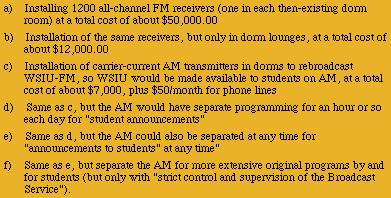 |
||||||
 |
||||||
 |
||||||
 |
||||||

This chapter is in two parts. This is part one.
Rodents in the Bureaucratic Maze
| In the early 60's, there was a main general decision-making body called the University Council. It contained representatives of faculty and others. There were sub-bodies of this, such as the Residence Halls Council, Student Council (Student Government), and Communications Council, which was essentially a committee whose purpose was to review campus and communications issues and make recommendations to the entire University Council. After receiving the Lueck WCBQ carrier current station proposal in 1962, the Communications Council failed to act. In March 1963, President Morris issued a policy statement which charged the CC with the duty "to make recommendations to the University Council on all proposals for adding to or deleting from the University communications media." Shortly thereafter, Richard Moore, then Student Body President-elect, requested the CC act on the Lueck proposal. In June, 1963, the CC did act. They recommended that the University Council approve it in principle, with the suggestion that "either the Residence Hall Council or Student Council submit a more specific proposal for review and approval" that would contain: |
||||||||||
 |
||||||||||
| In August, 1963, the University Council rejected this, sent the matter back to the CC, and told the CC to first get the proposal redrafted and then resubmit to the UC. In November, 1963, the CC instead decided that there should be an "Advisory Board for the Carbondale Campus Closed Circuit Radio Station," comprised of: |
||||||||||
 |
||||||||||
| and this board should prepare the revised proposal. This was only the CC's recommendation; it could not proceed without UC approval. In January, 1964, the UC rejected this. Instead, the UC instructed the CC to "investigate the alternatives for making the present FM programs (on WSIU-FM) available to the residence halls." The UC felt that the student need could be addressed if students could just receive WSIU-FM. The idea of a student-run carrier current station was going backwards. The CC then dutifully engaged Buren C. Robbins, Director, and Founder of the SIU Broadcasting Service, to prepare a report on the feasibility of making WSIU-FM available to all dorm residents, and how WSIU could address student needs. The CC also snuck in an additional item: Robbins should also evaluate how well a carrier current station would satisfy students' needs. Robbins' report was issued in April, 1964. Its main purpose was a cost/benefit analysis of a university-funded installation of FM receivers in dorms so students could listen to WSIU-FM! The report enumerated these alternatives: |
||||||||||
 |
||||||||||
| Robbins' final conclusion was to recommend d, based on cost and to "prevent the programs' getting out of control were students to control all, or part, of that programming." Robbins did say that if funds became available it might be OK to proceed with expanded student programming, but only "with great caution." After Robbins' report became public, at least several students protested in letters. Students wanted the experience of managing and operating a radio station and making their own programming decisions. The members of the Communications Council seemed to understand this. While they reluctantly acknowledged that choice "d" was the best way for WSIU-FM to reach students, the CC members pointedly stated that this would not provide the experience students wanted. The CC then became defiant by insisting that their prior recommendations (to create an interim board and authorize a student station in principle) be reconsidered. Their April, 1964, report also said: |
||||||||||
| 3. The Communications Council suggests that it might be in order for the University Council to recommend an overall review of WSIU-FM standards of programming in terms of both presentation and content. |
||||||||||
| The effort to create a student station was the victim of a "turf battle" between (on the one hand) administrators and faculty who wanted to facilitate student opportunities and (on the other hand) the broadcast service's interest in controlling all campus media; as well other University Council members were concerned with "out of control" students making programming decisions. The CC did not seem to hold WSIU-FM in high favor. It appears that the University Council again refused to accept the CC recommendations. |
||||||||||
end of Chapter 10, part 1
|
|||
|
|
|||
|
Message Board | The Source Contact |